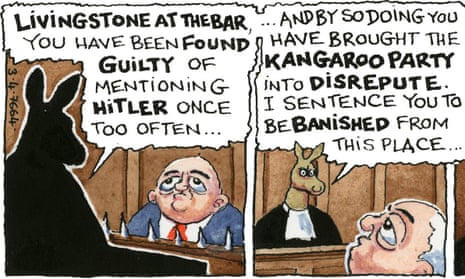Strong feelings, already primed, erupted when Steve Bell used his cartoon strip If… for four days (3-6 April) to attack Labour’s handling of the veteran party member and former London mayor Ken Livingstone.
Bell depicted a kangaroo court trying Livingstone for “mentioning Hitler once too often”. It passed sentence pre-plea “for an offence that isn’t actually an offence”, and furiously denounced the term “kangaroo court” as “a blatantly antisemitic stereotrope”.
Readers reacted to Livingstone’s remarks, Labour’s handling of him, and Bell’s take on it all. Excerpts will illustrate: “the old left’s tin ear for antisemitism”; “crude use of Jewish pain”; “no other minority has to suffer the calling-out of racism against it being so easily dismissed by people who are not of that minority”; “filth … [Bell] thinks anyone who complains about his Der Stürmer stereotypes … is talking nonsense”.
Some were supportive of Labour or Livingstone or Bell, saw the issue through the prism of Labour’s leadership strife, and were critical of a Guardian editorial which excoriated both Labour and Livingstone.
I compressed the main allegations involving Livingstone/Bell into a series of potential interpretations of his four strips, viewed as a whole, and put them all to Bell. I said this was a topic of great sensitivity, involving a vast weight of historical suffering, and it was best to be clear about intended meanings. The note ended: “As with all famed cartoonists, you have a big share of the freedom of the press and you rightly exercise it vigorously, so this kind of accountability follows.”
I asked Bell to think about it and respond in writing. Here is the result:
Were you defending Ken Livingstone against what you regard as an unfair Labour party process?
I was. The charge of “bringing the Labour party into disrepute” is a kind of indeterminate, catch-all offence that is capable of almost infinite interpretation. It has not been possible to sustain an accusation of antisemitism, since Ken Livingstone was not guilty of it. He could conceivably be open to the charge of insensitivity, but this does not warrant expulsion from the party. He had already been suspended from membership for over a year, which automatically cost him his place on Labour’s National Executive Committee. He was also subject to a vitriolic campaign of vilification across all media, beginning with John Mann’s slanderous description, on air, of him as a “racist” and a “Nazi apologist”. Mann was initially suspended from the party at the same time as Livingstone since his actions could just as legitimately be seen as bringing the Labour party into disrepute as Livingstone’s words, but Mann’s suspension was soon lifted. This demonstrates a lack of balance.
Were you defending Ken Livingstone against a charge that he brought the Labour party into disrepute by saying that Hitler was supporting Zionism before the Holocaust?
I was. He was arguing in defence of the Labour MP Naz Shah against charges of antisemitism that had been brought against her in relation to a joke that she had retweeted some time before she became an MP. Though his defence proved to be spectacularly ineffective and Naz Shah has since apologised for her inappropriate use of the words “the Jews” in a later tweet, I would say that if Ken Livingstone brought anyone into disrepute it was himself rather than the Labour party by unwisely introducing Hitler and the Nazis into a discussion of Zionism and contemporary antisemitism. At the moment the Labour party brings itself into disrepute very effectively every day in almost every way possible without Ken Livingstone’s help.
Were you defending Ken Livingstone against a charge that he was being antisemitic when he said that Hitler was supporting Zionism before the Holocaust?
I was. Ken Livingstone was talking about the narrowly defined actions and activities of parts of the Zionist movement in the 1930s that made the foundation of a Jewish state in the territory of Palestine its absolute priority. To question that aim does not constitute antisemitism.
Were you criticising the view that it is antisemitic to suggest that the suffering of Jews under the Nazis is somehow less deserving of empathy because a proportion of the Jews who left Germany under Nazi policies during the 1930s went to Palestine where Zionists later established the State of Israel?
This question is difficult to answer, since it confuses two separate issues, so I will try and untangle it: no one could possibly argue that the suffering of the Jews under the Nazis is somehow less deserving of empathy. If one did try and argue that point one would certainly be guilty of antisemitism. I don’t believe Ken Livingstone has ever attempted to make any such argument, or try and justify it with such a reason as “because a proportion of the Jews who left Germany under Nazi policies during the 1930s went to Palestine where Zionists later established the State of Israel”. I would never have supported him if he had.
Were you criticising the view that it is a misreading of history to suggest that Jews were somehow beneficiaries of, rather than victims of, Nazi government policies during the 1930s to remove Jews from Germany?
It certainly would be a misreading of history to suggest that Jews were somehow beneficiaries of Nazi government policies during the 1930s. The fact of negotiations between some Zionists and the Nazi government at the time is a separate issue. Attempting to suppress or deflect discussion of that issue with specious charges of antisemitism does not serve the cause of historical accuracy.
Were you taking issue with the term “antisemitic trope”?
I was. As you know I have a bit of history with your predecessor who upheld a charge against me of using “antisemitic tropes”. I don’t wish to go over the whole thing except to reassert that a trope needs to be antisemitic to be an “antisemitic trope”, and that my depiction of Netanyahu with a glove puppet of William Hague on one hand and Tony Blair on the other did not qualify. In the cartoon strip the use of the term “kangaroo court” is plainly not an “antisemitic trope” (or “stereotrope” as I brutally caricature the term). I believe that the charge of antisemitism is, and should be, a very serious one. Accusing someone of using “antisemitic tropes” is a kind of half-baked way of calling them an antisemite. It devalues and debases the term.
Were you being consciously antisemitic, that is, expressing hostility and prejudice towards Jews?
No, I am neither a conscious nor an unconscious antisemite. I am hostile to the idea of an entire population being held captive for 50 years in a stateless limbo. I have great sympathy for any people, no matter what their colour or creed, who are forced to live in such circumstances. The problem with all arguments around the question of Zionism is that, in current circumstances in the Middle East, it has less to do with race or religion and much more to do with land. It would be foolish to elevate or dignify one side’s claim, or indeed one side’s hatred, over another’s.
Since the charge of antisemitism is such a grave one, inappropriate use of the term is too often used to stifle debate around, for example, the BDS (Boycott, Divestment and Sanctions) movement, one of the few non-violent ways open to inhabitants of the occupied territories and their supporters to challenge the oppressive actions of successive Israeli governments. In the long run this cannot help the cause of peace.
Readers will make their own judgments. I accept Bell’s rebuttal-in-words of an antisemitism charge against him that reasonably arose from his images-with-words.
Cartoonists and their audiences need to be mindful of the powerful role that the artform played in the past – and can still play – in spreading virulent notions of otherness. Some in the “alt-right”, using newer technologies, seem to be trying the same again, with Jews and Muslims among the targets.
The Nazis co-opted cartooning, among other artforms, to their purposes. Those who know the history, lived the history, can be understandably quick to perceive in contemporary imagery the recurrence of attitudes that can create a mood that can facilitate a disaster.
The perception may mistake the intent, yet generate deep feelings nonetheless. Attempts to correct misperception and to disclaim malign intent need to take those feelings into account.
To acknowledge this is not to cede any of the freedom necessary to debate Israel-Palestine issues from all sides.
But it does require clarity from all sides, especially from critics and supporters of Israeli governments, from those who level charges of antisemitism, those who seek to rebut them, and those who try them in the court of public opinion.

